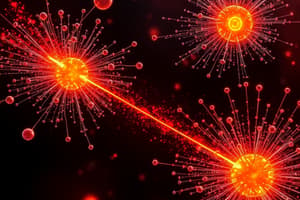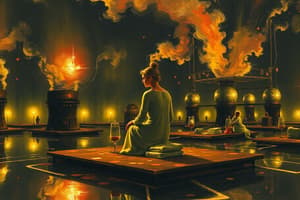Podcast
Questions and Answers
What is the approximate mass of a neutron?
What is the approximate mass of a neutron?
- 1.5 atomic mass unit (amu)
- 1 atomic mass unit (amu) (correct)
- 0.5 atomic mass unit (amu)
- 2 atomic mass unit (amu)
What is the electric charge of a neutron?
What is the electric charge of a neutron?
- Variable
- Neutral (correct)
- Negative
- Positive
What is the spin of a neutron?
What is the spin of a neutron?
- 3/2
- 2
- 1
- 1/2 (correct)
What happens to a free neutron after around 10 minutes?
What happens to a free neutron after around 10 minutes?
What is one application of neutron scattering?
What is one application of neutron scattering?
Where are neutrons produced as a byproduct?
Where are neutrons produced as a byproduct?
Flashcards are hidden until you start studying
Study Notes
Properties of Neutrons
- Mass: Neutrons have a mass of approximately 1 atomic mass unit (amu), which is slightly heavier than protons.
- Charge: Neutrons have no electric charge, making them neutral particles.
- Spin: Neutrons have a spin of 1/2, which is a fundamental property of fermions.
Stability of Neutrons
- Free neutrons: Neutrons are unstable when they are not bound to a nucleus and undergo beta decay with a half-life of around 10 minutes.
- Bound neutrons: Neutrons are stable when they are bound to a nucleus, forming a stable atomic nucleus.
Interactions of Neutrons
- Nuclear reactions: Neutrons can participate in nuclear reactions, such as fission and fusion, where they interact with atomic nuclei.
- Scattering: Neutrons can scatter off atomic nuclei, which is the basis for neutron scattering techniques used in materials science and biology.
Applications of Neutrons
- Neutron scattering: Used to study the structure and dynamics of materials, including biological molecules and materials.
- Nuclear reactors: Neutrons are used to sustain nuclear reactions in reactors, generating electricity.
- Cancer treatment: Neutrons are used in some forms of cancer treatment, such as neutron capture therapy.
Neutron Sources
- Nuclear reactors: Neutrons are produced as a byproduct of nuclear fission reactions in reactors.
- Particle accelerators: Neutrons can be produced through the collision of high-energy particles, such as protons or electrons, with a target material.
- Spallation sources: Neutrons are produced through the collision of high-energy particles with a target material, resulting in the emission of neutrons.
Studying That Suits You
Use AI to generate personalized quizzes and flashcards to suit your learning preferences.


